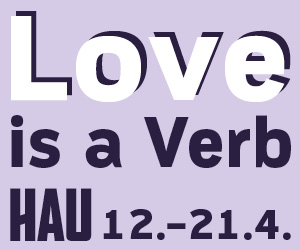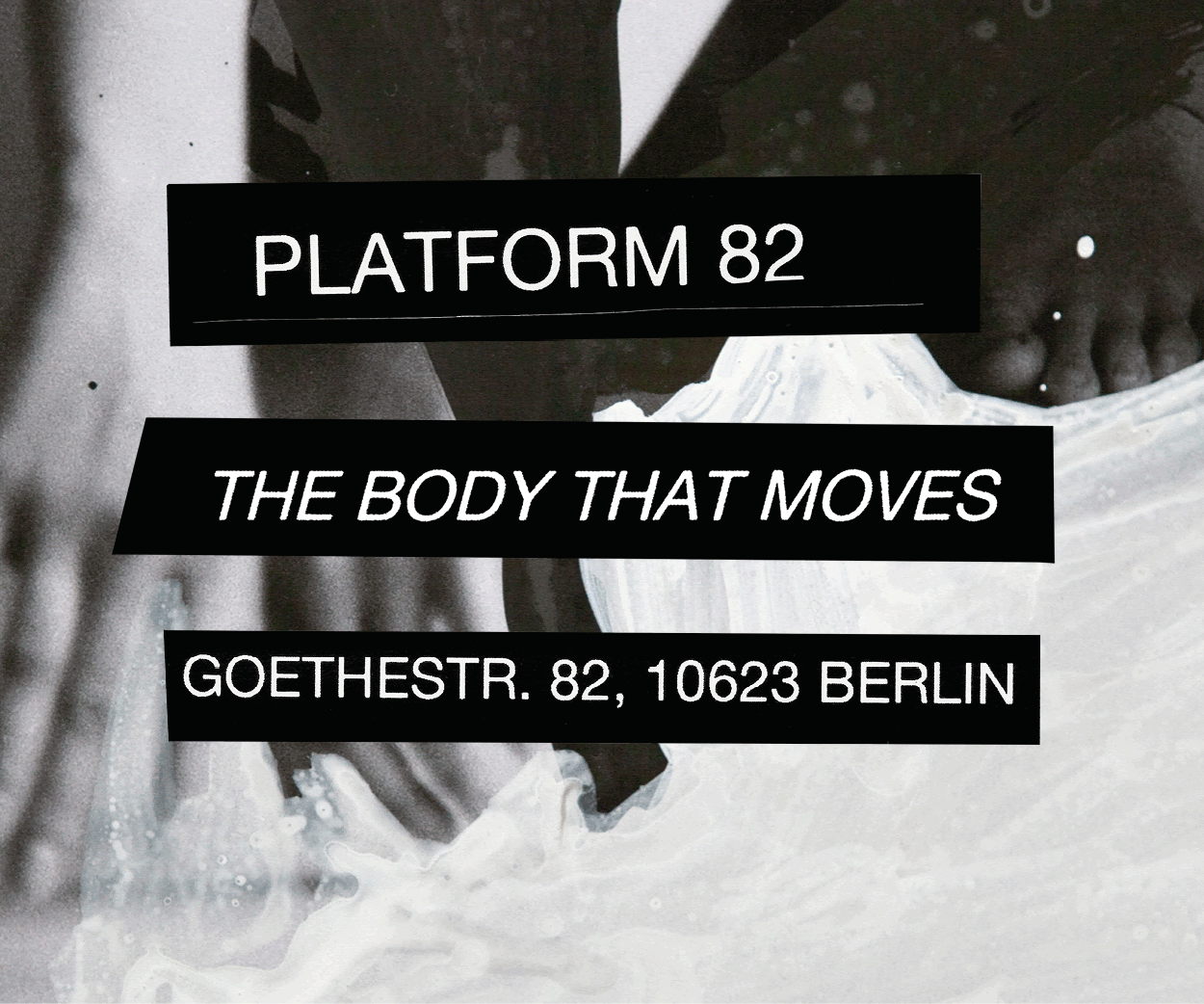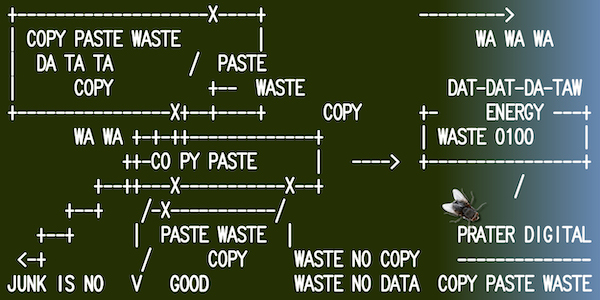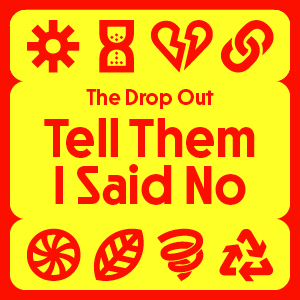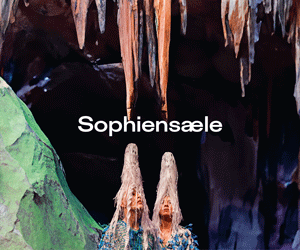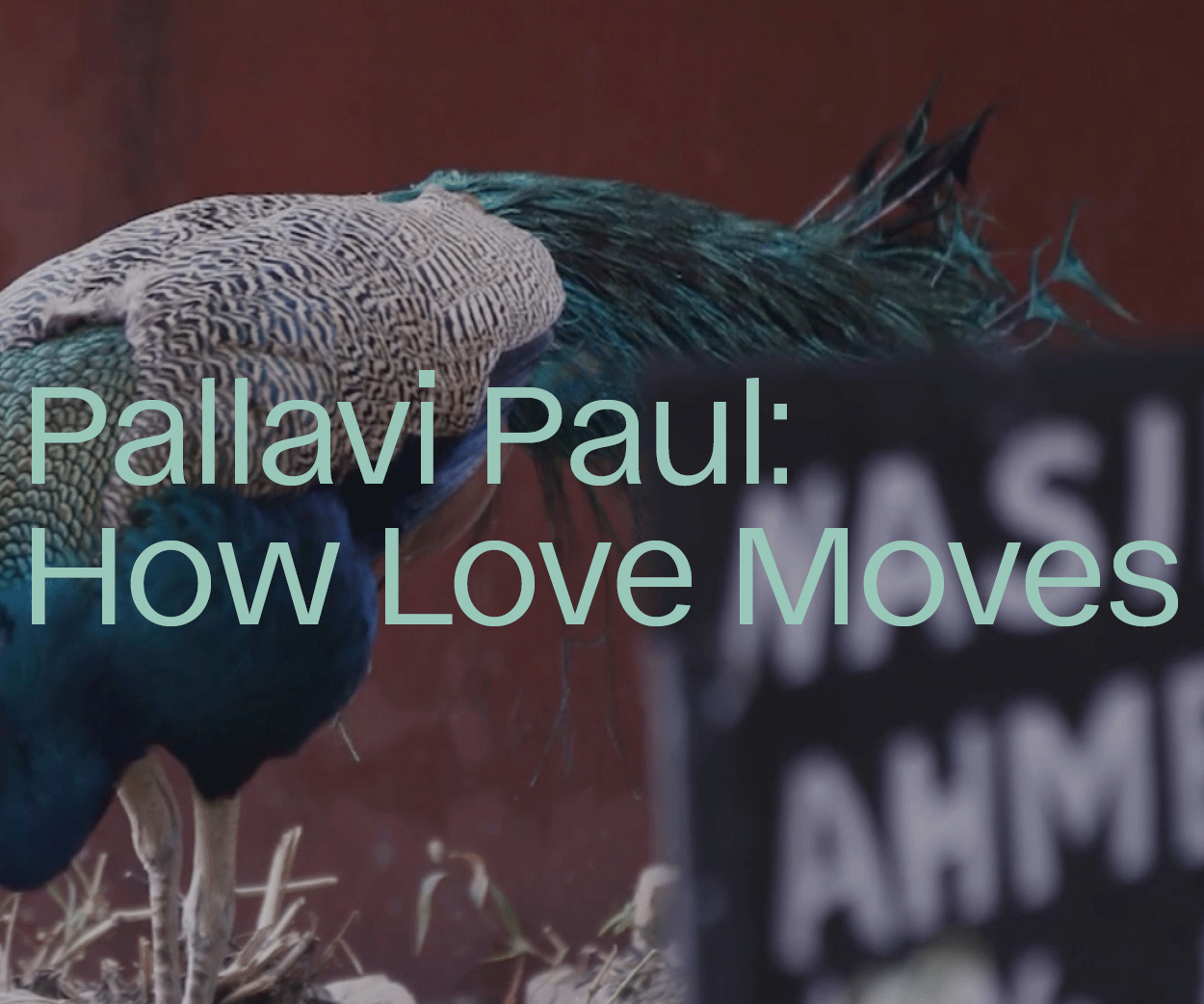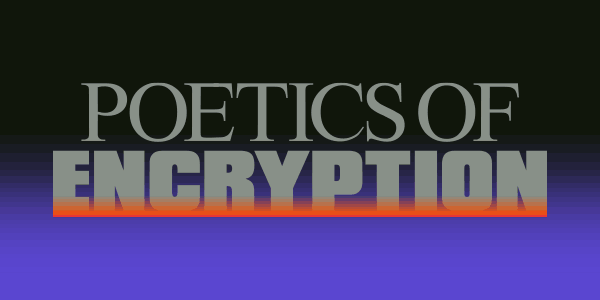by Noëlle BuAbbud // Nov. 27, 2020
When we consider the “art world”—names and institutions celebrated, flows of capital—we must also consider the often invisible labor of cultural workers. Contemporary cultural production is upheld by structures that are exclusive, extractive and exhausting. Artists and cultural workers internalize the harmful and delusional ideas that, in order to participate in a creative field, they must forgo their collective needs and well-being and accept (with gratitude) crumbs of exposure and funding. The toxicity of this environment inhibits innovation and frequently leads to burn-out.
Sickness Affinity Group (SAG) offers an alternative to an individualized, competitive mode of artistic production. SAG functions as a support group centered around sickness/disability and expanded networks of care. I had the chance to visit the SAG reading room, presented this October at Kotti-Shop in Kreuzberg, which provided much-needed time and space to discover and meditate on contexts of creation that are centered around accessibility, not just as a topical trend, but as the foundation of collectivity inherent in all artistic work. We spoke to members of SAG—Romily Alice Walden, Katrin Dinges, Frances Breden, Lauryn Youden, Inga Zimprich—about their recent participation in the Berlin Biennale, their workshop series and what it means to foster a supportive care environment at a time of increased precarity. The work SAG is doing is indicative of possibilities outside of the limited scope of the art world as it presently exists.
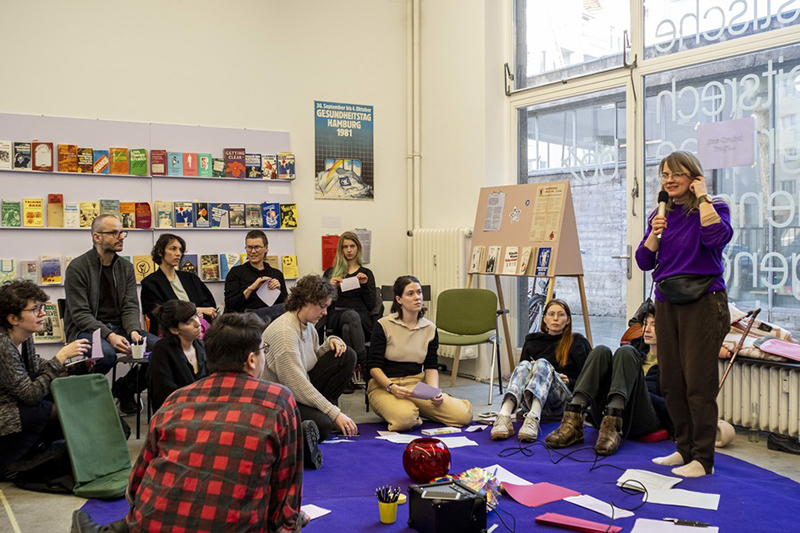
Sickness Affinity Group: ‘The Fatigued Compassionate Oracle’ at exp. 2 Berlin Biennale 11, February 2020 // Photo by Matthias Völzke
Noëlle BuAbbud: Could you briefly introduce us to SAG’s projects and practice?
Sickness Affinity Group: Sickness Affinity Group emerged from a situation where three queer/feminist art groups competed for funding and reached out to each other to instead form alliances. SAG, first and foremost, is a resource-sharing and support group made up of art workers and activists who work on the topic of sickness/disability and/or are affected by sickness/disability. We hold bimonthly support group meetings that are open to anyone and we have a mailing list.
Aside from functioning as a support group, we aim to create formats that offer room to voice needs, share frustration and offer support between artists operating on sick, crip and/or caring time. The ‘Fatigued Compassionate Oracle’, for instance, is a public collective voice aiming to support sick, disabled and care-giving artists and cultural workers with navigating accessibility and working conditions. We performed the ‘Fatigued Compassionate Oracle’ at exp. 2 of Berlin Biennale 11 and recently at Symposium der Unvernunft. SAG is about to publish wisdom and questions of the multi-bodied, all-knowing and endlessly compassionate Oracle in a two-volume zine in 2021. Most recently we developed the Sick Time Press Workshop series, which aimed to share knowledge of self-publishing artistic publications with chronically ill, sick and disabled artists.
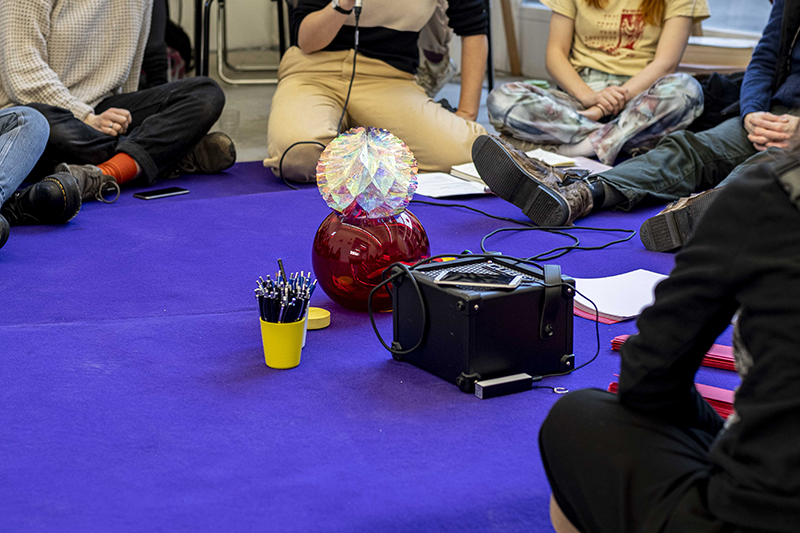
Sickness Affinity Group: ‘The Fatigued Compassionate Oracle’ at exp. 2 Berlin Biennale 11, February 2020 // Photo by Matthias Völzke
NB: What does an accessible “art world” look like for you? In which ways are ableism and exclusivity engendered in this sector?
SAG: The support group aspect of Sickness Affinity Group is a means to create contexts of trust and mutuality, in which we can rest from the omnipresent production pressure, rivalry and ableism of the art field. Yet it is not easy to keep production pressure away from the group. We have all internalized that in the art field we should strive for growth, visibility and attention. Making work processes non-exhaustive, setting realistic deadlines for ourselves and placing group members’ wellbeing at the centre of the group’s activity requires us to unlearn and actively interrupt how one usually operates in the art field.
We think centering accessibility also challenges capitalist, precarious, unregulated, individualistic and toxic working modes in the art world, simply by working at our own speed, centering wellbeing and working collectively. It makes me (Fran) think of Adrienne Marie Brown’s quote from Emergent Strategy: “Move at the speed of trust”.
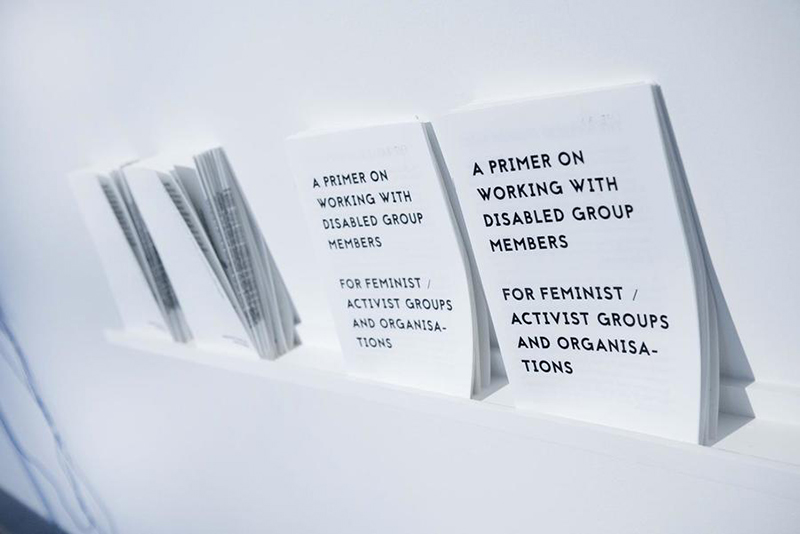
Romily Alice Walden: ‘A Primer on Working With Disabled Group Members for Feminist/Activist Groups and Organizations’, A4 Risograph Publication, 2018, AIR Gallery, NYC // Credit Colin Davison
NB: How does accessibility, as both the form and the content of your work, become a curatorial framework?
SAG: Our work is formed and shaped around the access needs of our members and our participants. So often in the art world access is an afterthought; if thought of at all, minimal access measures are implemented in a very cold, inadequate and last minute manner. We understand access and care as generative, messy, multilayered and intimate, and as something to strive for from the outset of any work that we take on. Working under the constraints of lack of funding, time, energy, members holding multiple jobs and balancing multiple medical conditions, we don’t ever do this perfectly but we are trying to learn from every failing to better centre access within our work together.
For me (Katrin), accessibility is created through spatial components and social agreements, when I can orient myself independently and when my communication aids are accepted and made use of naturally. If I feel my assistance is disturbing, I am a nuisance with my access needs, I am in the way because it seems impossible to wait for transcription or to speak more slowly, then I don’t feel welcome. I might leave during the break or don’t feel like attending again.
We need to create conditions for participation that allow people to join, even if they are exhausted, if they need a break, translation or transcription or when transport is an issue. My practical experience is that SAG has managed this. In self-organized spaces this requires us to inquire about access needs and to alternate the different roles to accommodate them. This implies the choice of communication and meeting platforms. To create accessibility you need to plan until it works.
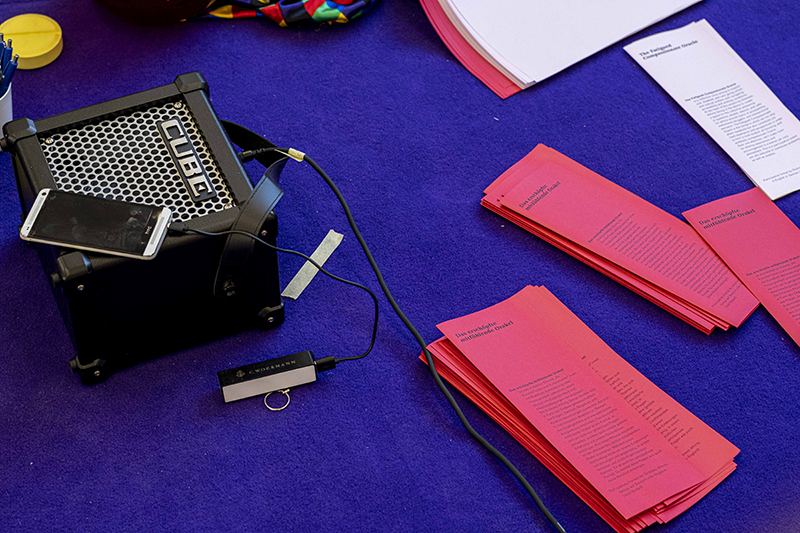
Sickness Affinity Group: The Fatigued Compassionate Oracle at exp. 2 Berlin Biennale 11, February 2020 // Photo by Matthias Völzke
NB: Can you talk about some examples of your workshops, such as the recent SAG Reading Room?
SAG: The idea of the Sick Time Press Workshop Series has been to approach zine making as a tool in which people can express themselves in a self-determined manner. Zine making is cheap, we can distribute our zines independently and establish supportive networks. In the series, four teams of artists each gave one workshop on a specific aspect of zine making and we have tried out different ways to open up the possibilities to participate in them, also in light of the specific Covid-19 regulations that were and are challenging.
The first workshop of the series was from Anisha Müller of Femme Fitness and the visual artist Laura Lulika. Their workshop ‘Sharing Movement through Collage and Print’ brought together embodiment practices and self-publishing. They did a really good job of reacting to the evolving pandemic and centering accessibility. They created mailers and sent them out to participants, who then read through the exercises and could work with materials Anisha and Laura had sent. They also had a Zoom call for everyone to meet and talk through the exercises. This was a really special way to create connection during the first lockdown.
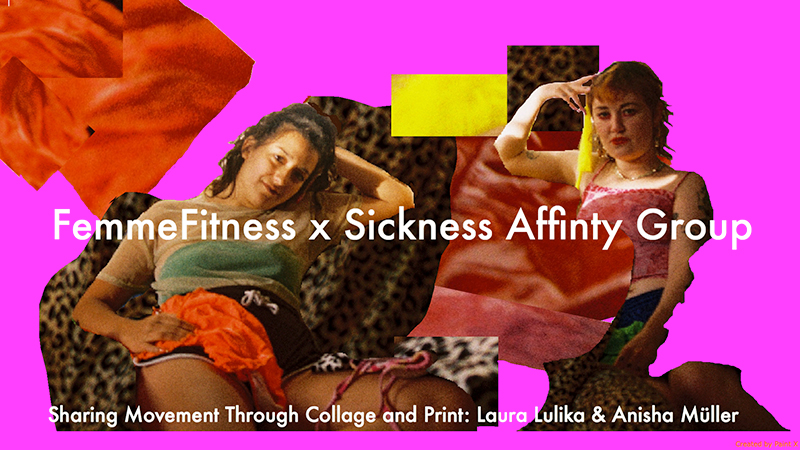
Femme Fitness x Sickness Affinity Group: ‘Sharing Movement Through Collage and Print’, 2020, As part of the Sick Time Press Workshop Series // Courtesy of Sickness Affinity Group
One workshop, led by Clay AD and Romily Alice Walden, taught participants how to do risograph printing. Riso is cheap to use, eco friendly and very speedy, which makes it perfect for sharing activist / radical information in an accessible way. It can be hard to learn how to use the machines, so the workshops introduced people to the medium with the hopes that they can then come back to riso again in the future and make their own work.
For the workshop ‘Sprache in Krise’ (language in crises) the poet and cultural mediator Katrin Dinges and artist Inga Zimprich created workshop materials that help us reflect how we use language in crises, in search for support, nourishment and political articulation. The workshop materials are available as a PDF for download and accompanied by instructive videos in German sign language and spoken language.
The last in-person event for the workshop series was a reading room we opened at Kotti-Shop, that Fran and Lauryn mainly worked on. Working with Kotti-Shop was great because everyone in the neighbourhood knows the spot and feels very welcome to come in and read. We’re really happy to have compiled great work from various chronically ill and disabled self-publishers and zine-makers, who make work about health and accessibility, and hopefully we’ll find a home for this library in the future!
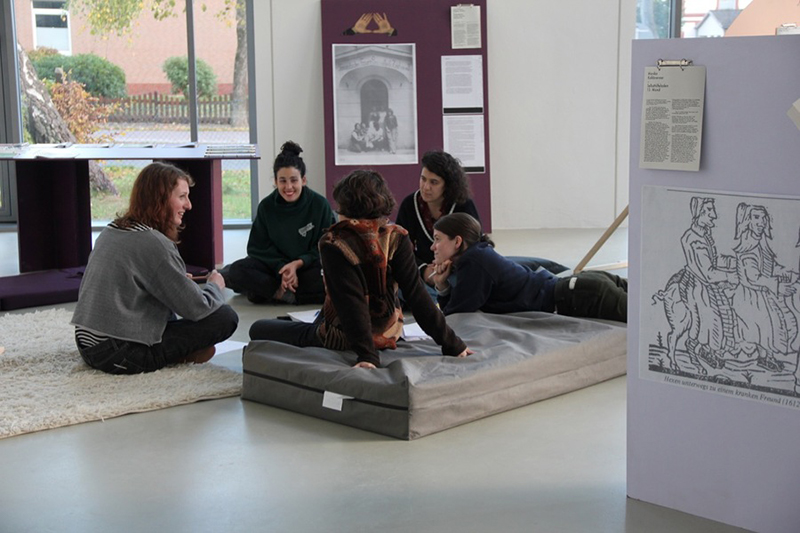
Sickness Affinity Group: Workshop, ‘Sick Time, Crip Time, Caring Time with members of FGRG and Sickness Affinity Group’, 2019, M.1 Hohenlockstedt // Credit Sickness Affinity Group
NB: What kind of collaborations do you envision developing in the future in terms of workshops, pedagogy, community outreach or institutional interventions?
SAG: We realize right now that SAG needs some time to prioritize internal questions instead of jumping into the next production. This is important to us as we understand that topics such as health, care, disability and accessibility are trending in the art field but unfortunately that doesn’t necessarily mean that the field also offers a lasting commitment to create working environments where people’s access needs are being anticipated and met.
The first thing we want to do right now is find a way for our resource-sharing/support group meetings to be functional and replenishing on Zoom; as many others are, we’re getting some Zoom fatigue. It feels like an important moment to come back to our core activity and figure out how best to take care of each other. Our next aim is to work with an accessible web designer to make our website more usable for people with different access needs.


